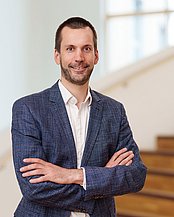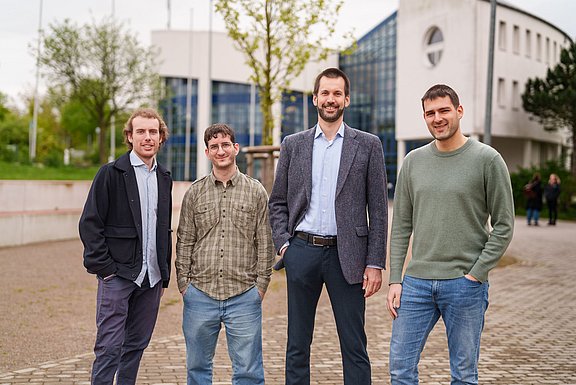
Prof. Dr.
Nils Bormann
Professor
Faculty of Management, Economics and Society (Department of Philosophy, Politics and Economics) | Professorship of International Political Studies
Programme Coordinator B.A. Philosophie, Politik und Ökonomik
Faculty of Management, Economics and Society (Department of Philosophy, Politics and Economics)
Professorship of International Political Studies
Nils Bormann is Professor of International Political Studies.
The professorship investigates the causes of instability in multi-ethnic and/or democratic societies. The team is particularly interested in the ability of elite coalitions to prevent political violence. Civil wars are at the centre of attention. The research focus is therefore at the interface between comparative political science and international relations.
The methodological orientation results from the theoretical questions. The professorship frequently examines geo-localised data sets using statistical models in order to determine risk factors for civil wars and the chances of survival for elite coalitions and democracies. At the same time, the team tests the plausibility of these models using case studies.
Our questions:
Under what circumstances do political elites decide in favour of coalitions in ethnically, economically or religiously strongly divided societies?
How can coalitions of pro-democratic elites successfully assert themselves against opponents of democracy and thus avert dangers to democracy?
What influence do economic inequalities between politically relevant groups have on the risk of civil war?
What can politics and society do to reduce strong social tensions based on ethnic or economic divisions?
What can we learn from political conflicts? How does instability arise? Why do civil wars arise?
Current replacement for the professorship: Dr Matthias Mader
From April 2024 to March 2026, the professorship will be held by Dr Matthias Mader. His research focuses on the interplay of international and national politics in established democracies. In particular, he looks at how international events and elite communication influence public opinion and political behaviour and what electoral incentives this in turn creates for political parties.
Research
Prof. Dr Nils-Christian Bormann, Bruno Della Sala, Olga Jerjomina, Stefan Stojkovic and Dr Edoardo Vigano are currently investigating the extent to which political violence jeopardises the quality and survival of democracies in the Democracy, Anger, and Elite Responses (DANGER) project. European democracies of the interwar period (1919 - 1939) are at the centre of the analysis of the project funded by the European Research Council (ERC). Based on the findings from the past, the team is drawing up risk assessments for European democracies in the present.
The civil war and the far-reaching upheaval processes in Ethiopia are also at the centre of the research. The focus here is on domestic and foreign policy reforms, which are simultaneously accompanied by ethnic tensions, outbreaks of violence and internal displacement. The focus region is Tigray, where the conflict escalated militarily in November 2020.
Further research projects:
- Elite coalitions and civil wars
- The diffusion of wars of independence
Employees

Ph. D. Edoardo Vigano
M. A. Bruno della Sala
M. Sc. Stefan Stojkovic
M. A. Olga Jerjomina
Dr. Matthias Mader
M. Sc. Martin Grauduszus
Resume
- Since October 2020: Professor of International Political Science at Witten/Herdecke University
- Positions at the University of Essex (UK), the University of Exeter (UK), Perry World House at the University of Pennsylvania (USA), the University of Pittsburgh (USA) and The Politics of Inequality Cluster at the University of Konstanz
- Swiss Federal Institute of Technology in Zurich (ETH): Master in Comparative and International Studies and PhD in Political Science
- Jacobs University Bremen: Bachelor in Integrated Social Studies
Teaching
The teaching centres on questions of instability in multi-ethnic and/or democratic states. With the help of methodologically diverse analyses, we look for factors that contribute to some regions or states being more stable than others. We also use insights from political science to develop solutions to violent conflicts at local, national and international level.
Students will draw on insights from philosophy and economics to develop innovative and constructive approaches to problems of political instability. In order to create a basis for interdisciplinary work, we teach them skills in the critical analysis of data and texts.
An excerpt from current and past courses:
- International Relations (B. A.)
- Comparative Politics (B. A.)
- War and Peace (B. A.)
- Basics in Politics II: Introductory International Relations (M. A.)
- Security (M. A.)
- Foreign Policy (M. A.)
Press expert for
- Dangers for democracy
- Violence & Democracy
- Civil wars
- Political violence
- Separatism
Further information
Memberships
- Working Group Peace & Conflict Research
- American Political Science Association
- German Political Science Association
- European Political Science Association
- Peace Science Society (International)
News
Scientists warn of increasing risk of war
Survey by Witten University shows experts see increasing risk of military conflict between the EU and Russia.
No light on the horizon: Why the war in Ukraine continues
Expert from Witten University, Prof Bormann, on the role of the US, Putin's goals, China's calculations, and the lack of prospects for peace.
Populism in the election campaign: How political rhetoric is influencing the current election campaign
Prof Dr Nils-Christian Bormann from Witten/Herdecke University warns of the risks of populism.
"The invasion of Ukraine by the Russian army marks a turning point in Europe"
For UW/H conflict researcher Prof Dr Nils-Christian Bormann, the invasion is the preliminary culmination of aggressive nationalism by the Russian president.
DANGER research project sheds light on political violence
Professor at Witten/Herdecke University is researching the dangers to European democracies posed by political violence.